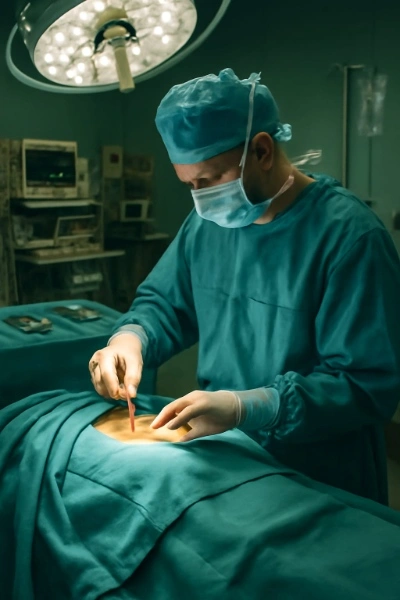Overview
The Department of Surgical Oncology at Believers Hospital is dedicated to providing cutting-edge cancer care with a compassionate touch. Our approach to cancer treatment goes beyond traditional methods, embracing innovative techniques such as organ preservation, minimally invasive surgery, and enhanced recovery after surgery. We believe in evolving daily to ensure the best outcomes for our patients.
Collaborative Excellence in Cancer Specialties
Collaboration is at the heart of our practice. Our Oncosurgeons work closely with experts from various cancer specialties, including Medical Oncology, Radiation Oncology, Onco-Pathology, Onco-Radiology, Onco-Anaesthesia, Nuclear Medicine, Palliative Care, Physical Medicine and Rehabilitation, and more. This collaborative approach allows us to tailor surgical treatments to each patient's unique needs, ensuring they receive a comprehensive and personalized care plan.
Constant Learning for Unparalleled Expertise
In the realm of Onco-surgery, our skilled oncology surgeons continuously update their knowledge to stay at the forefront of advancements. Recognizing the pivotal role of tumor biology in cancer treatment, our perspective on operability has shifted. Cases once considered inoperable are now carefully evaluated for surgery, and vice versa, as we prioritize both oncologic safety and patient well-being.
Holistic Cancer Care: Beyond the Physical
At Believers Hospital, we understand that each patient's journey is distinct. Our commitment is to provide prompt and indicated modalities of treatment in the proper sequence, maximizing the potential for the best possible outcomes. We believe in a holistic approach to cancer care, addressing not only the physical aspects but also the emotional and psychological well-being of our patients.
Together, we strive to make a difference in the lives of those affected by cancer, offering hope and healing every step of the way.
If you have any questions or would like to schedule a consultation, please don't hesitate to reach out at 0469 2703100 / 101, extension 4692 / 4688.
Services
Carcinoma of Lip & Oral Cavity
-
We perform wide excisions to remove cancerous tissues.
-
Neck dissections are conducted to address lymph node involvement.
-
Reconstructive surgeries are provided to restore function and appearance.
Minor / Major Salivary Gland Carcinoma
-
Salivary gland tumors are excised.
-
Neck dissections are done to manage regional lymph nodes.
Laryngeal Cancer
-
Total laryngectomy combined with partial pharyngectomy is performed.
-
Neck dissections may be included if necessary.
Thyroid Cancer
-
We offer thyroidectomies to remove the thyroid gland.
-
Neck dissections are performed for lymph node management.
Lung Cancer
-
Keyhole surgeries are available for minimally invasive treatment.
-
Lobectomies are done to remove a lung lobe.
-
Mediastinal lymph-node dissections are performed for comprehensive care.
Breast Cancer
-
Breast conservation surgeries aim to remove the tumor while preserving the breast.
-
Oncoplastic techniques are used for better cosmetic outcomes.
-
Sentinel node biopsies are performed to check for cancer spread.
-
Axillary lymph node dissections are done if lymph nodes are involved.
-
Modified radical mastectomies are provided for extensive disease.
Esophageal Cancer
-
Thoracoscopic (keyhole) surgeries are performed for less invasive treatment.
-
Different types of esophagectomies (McKeown, Ivor Lewis, Orringer) are conducted.
-
Comprehensive 2-field lymphadenectomies are included.
Gastric Cancer / GIST
-
Keyhole surgeries are performed for minimally invasive removal.
-
Radical gastrectomies (total or distal) and sleeve gastrectomies are done with D2 lymphadenectomy.
Colon Cancer
-
Keyhole surgeries are provided for less invasive treatment.
-
Hemi or total colectomies are performed to remove affected colon sections.
-
Liver metastasectomies are done for secondary liver tumors.
Rectal Cancer
-
Keyhole surgeries are performed for less invasive treatment.
-
Various resections (AR, LAR, APR, ELAPE) are available based on the tumor's location.
-
Liver metastasectomies are done for secondary liver tumors.
Pancreatic Cancer
-
The Whipple’s procedure is performed for tumors in the pancreatic head.
-
Distal pancreatectomies with splenectomy are done for tumors in the pancreatic body and tail.
Hepatocellular Carcinoma
- Anatomical liver resections are conducted to remove cancerous liver segments.
Bile Duct Cancer
- Bile duct resections and reconstructions are performed.
Gallbladder Cancer
- Extended cholecystectomies are done to remove the gallbladder and surrounding tissues.
Renal Cell Cancer
-
Keyhole surgeries are performed for less invasive treatment.
-
Radical or partial nephrectomies are done to remove kidney tumors.
Urinary Bladder Cancer
-
Keyhole surgeries are provided for less invasive treatment.
-
Radical cystectomies with ileal conduit urostomies are performed.
Penile Cancer
-
Partial or total penectomies are done to remove the tumor.
-
Ilio-inguinal block dissections are performed for lymph node management.
Testicular Cancer
-
High inguinal orchiectomies are performed to remove the affected testicle.
-
Retroperitoneal lymph node dissections are conducted if necessary.
Carcinoma Ovary
-
Staging laparotomies are performed to assess cancer spread.
-
Cytoreductive surgeries and HIPEC are done for advanced disease.
Carcinoma Endometrium
-
Keyhole surgeries are performed for less invasive treatment.
-
Radical hysterectomies are done to remove the uterus.
-
Sentinel node biopsies are conducted to check for cancer spread.
-
Bilateral pelvic and retro-peritoneal lymph node dissections are performed.
-
Pelvic exenterations are done for extensive disease.
Carcinoma Cervix
-
Radical hysterectomies are performed to remove the uterus.
-
Bilateral pelvic node dissections are conducted.
-
Pelvic exenterations are provided for extensive disease.
Vulvar Cancer
-
Radical vulvectomies are performed to remove the tumor.
-
Inguino-femoral node dissections are done for lymph node management.
Extremity / Trunk Sarcoma
- Wide excisions or limb-sparing surgeries are conducted to remove sarcomas.
Retroperitoneal Sarcoma
- Wide excisions or multivisceral resections are performed to remove tumors.
Skin Cancer
- Wide excisions with sentinel lymph node biopsies or lymph node dissections are provided for comprehensive treatment.
Special Services Offered
-
Breast conservation and perforator based Oncoplastic breast reconstruction surgery
-
Sentinal lymphnode biopsy for breast, skin and endomtrial cancers
-
Chemoport insertion
-
Pedicled flap reconstruction for oral cavity cancers
-
ComplexMultivisceral resection surgery for ovarian and GI cancers and retroperitoneal and pelvic tumours.
-
Peritonel surface maligancies- cytoreductive surgeries (HIPEC)
-
Minimally invasive laparoscopic surgery- for GI, Gynec and Urological cancers
-
Thoracoscopic surgery for mediastinal tumours, lung and esophageal cancers


